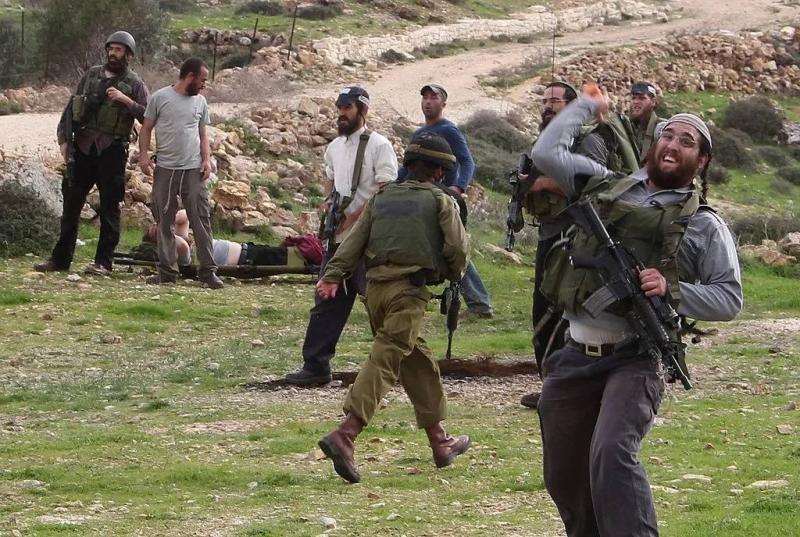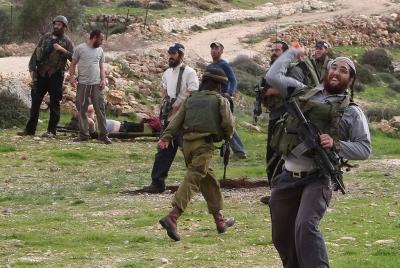Statements made by former Israeli Prime Minister Ehud Olmert highlighted the group known as "Youth of the Hills," noting that "a large majority of Palestinians killed in the West Bank since October 7 were not necessarily killed for compelling reasons, nor by qualified Israeli security forces, but rather by individuals like the Youth of the Hills." In a podcast published by the Israeli newspaper "Haaretz," Olmert accused Prime Minister Benjamin Netanyahu of failing to defend Israelis due to "overconfidence and arrogance," asserting that the current government is "deliberately steering Israel toward a comprehensive war." He reminded listeners that "with the support of a minister in the government for violent factions of settlers, they are attacking Palestinians and looting their homes," accusing the current government of perpetuating conflict and avoiding a long-term ceasefire, adding that "this is why the hostage release deal is delayed."
Since the outbreak of war on October 7 between Israel and Hamas in the Gaza Strip, the West Bank has witnessed attacks carried out by Palestinians against Israelis, as well as near-daily raids conducted by the Israeli army, frequently resulting in fatalities in this territory occupied since 1967. The Israeli NGO "Yesh Din" recently reported that violence committed by settlers against Palestinians in the West Bank "reached a record high in 2023." The United Nations also reported 1,225 attacks perpetrated by settlers against Palestinians during the same year.
#### Who are the "Youth of the Hills"?
The "Youth of the Hills" or "Shbibat HaGvaot" is described as an extremist right-wing movement accused of committing attacks against Palestinians. They emerged under this name only in late 1998, when then Israeli Defense Minister Ariel Sharon called on the youth of the settlements to "seize the hilltops" in an effort to thwart peace talks. Sharon stated at the time: "Everyone there should move and run, seize more hills, and expand the area. Everything that is held will be in our hands; everything we don't hold will be in their hands."
According to a study titled "Youth of the Hills and New Media," this group refers to "religious Jewish youth in Israel, who live separately from their families in illegal settlement outposts established on hilltops across Judea and Samaria," as termed in the West Bank. They are estimated to number in the hundreds, but it is difficult to obtain an accurate picture since there are no official institutions linked to this group, nor any regulatory body overseeing their activities. Most of their members hail from families connected to the religious Zionist movement "Dati Leumi."
They may live for several months or years in these settlement outposts, often under challenging living conditions, typically arriving at these settlements between the ages of 15 to 18. They often remain there after finishing high school or completing their military service, marrying one another and building their homes. According to prior literature on them, they are divided into two groups: the first is based on their social background as "settlers," mostly from the second and third generations who have lived through tumultuous times; the second is "urban dwellers," young people from low or middle social and economic backgrounds, who move to the hilltop settlements, leading to feelings of alienation from their original communities.
The "Youth of the Hills" have "deep ideological and religious motivations," such as a complete separation between boys and girls, and live a daily routine dependent on agriculture and guarding. The study indicates that they live "without any formal contact with neighboring communities," and view the expansion of settlements as "completing the settlement legacy of their forefathers." Their lives are characterized by "constant tension and violent conflicts" with Palestinian residents, with many "terrorist acts" against Palestinians attributed to the "Youth of the Hills," who have damaged Palestinian properties, caused injuries, and killed some.
The practices of the "Youth of the Hills" have created divisions within Israeli society; some see them as a mix of oddballs, troublemakers, marginalized youth, and zealous extremists, while others view them as "idealists, dedicated, innovative thinkers ready to face any challenges." Others consider them "teenagers facing identity crises similarly to their peers but at a heightened level, accompanied by various risks and distrust in civil society institutions and their services."
They reject the use of smartphones and social networks, and may carry them when outside their settlements, but upon returning, they only bring phones capable of providing voice communication. In another study, the "Youth of the Hills" are characterized as "an extremist, violent, and lawless group of young Jewish settlers in the occupied West Bank," who "choose to interpret their faith in a strict manner as a guiding compass toward salvation," living "a path fraught with violence and aggression toward Palestinians and even Israeli authorities," as they "embrace fierce chaos in their pursuit."




